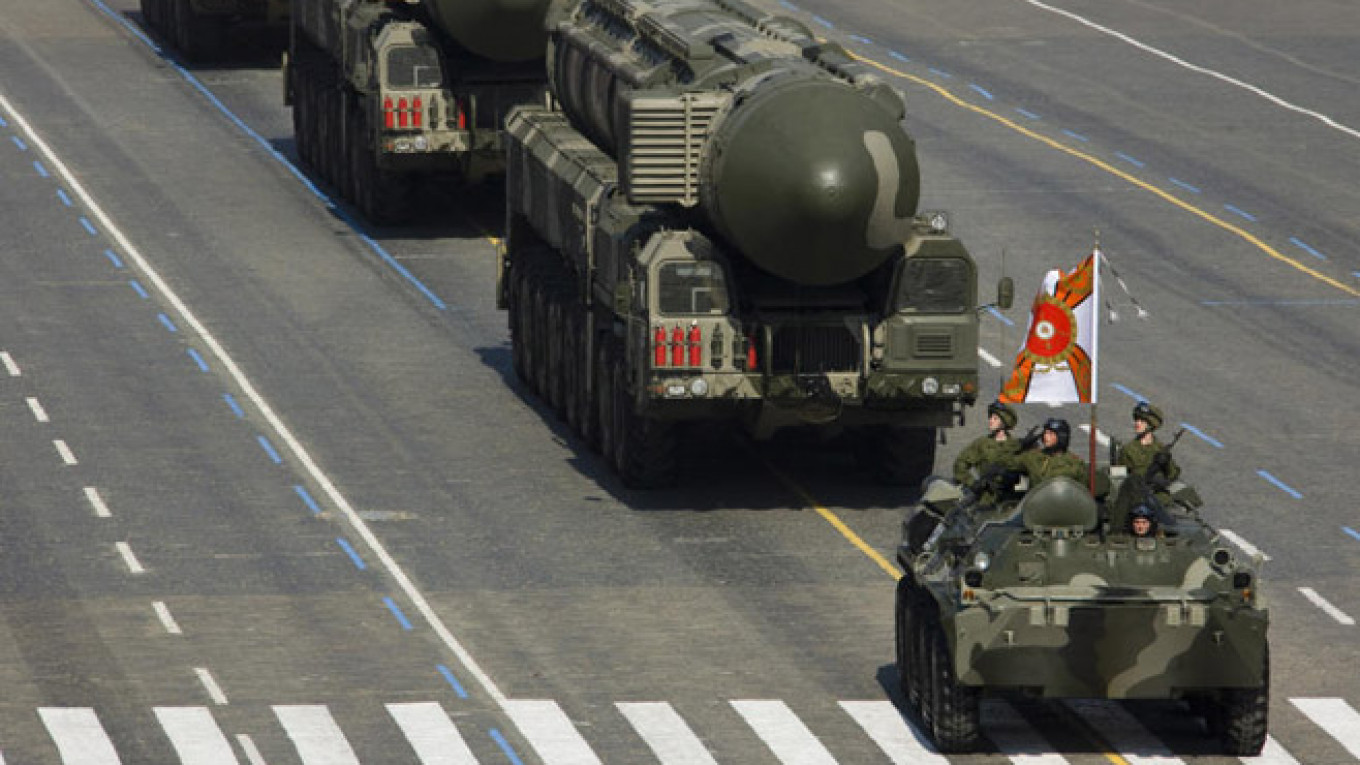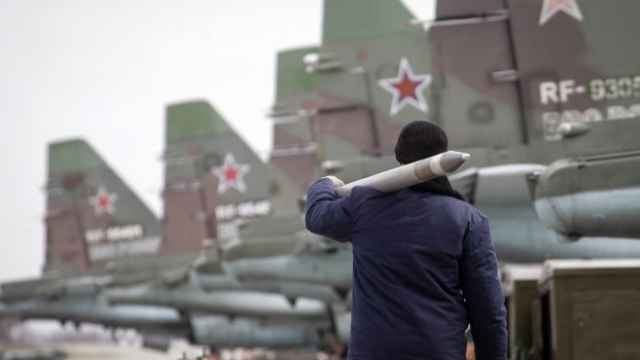The revelation Sunday that President Vladimir Putin had been prepared to bring Russia's nuclear weapons into a state of alert last year amid soaring tensions over the Crimean Peninsula makes one thing clear, analysts told The Moscow Times: Russia won't give up on Ukraine, even if faced with the threat of nuclear war.
Asked about Russia's nuclear preparedness, Putin told state television channel Rossia-1 that concerns of a potential Western intervention into Crimea last year forced him and his top security officials to consider putting Russia's nuclear arsenal on combat alert. "We were ready to do this. I spoke to my colleagues and told them that [Crimea] is our historic territory, Russians live there. They were in danger. We couldn't abandon them," Putin said in an interview, filmed for a documentary produced to celebrate the one-year anniversary of Crimea's annexation.
He went on to explain the ultimate decision not to make that bold step: "Despite all of the difficulties and the drama surrounding the situation, the Cold War is over, and we do not need international crises like the [Bay of Pigs]," Putin said. "Moreover, the circumstances did not call for such actions, which would have been contrary to our own interests."
According to Andrei Burbin, the head of the central command headquarters of Russia's Strategic Missile Forces, said in comments to radio station Russian News Service on March 1 that Russia's nuclear forces are "on constant combat alert."
"In peacetime our primary strategic task is deterrence, but if the need arises to make a nuclear missile strike, we will fulfill this task in a fixed time. We are absolutely certain," Burbin said.
In accordance with the country's 2014 military doctrine: "Russia reserves the right to use its nuclear weapons in response to the use of nuclear weapons or other weapons of mass destruction against Russia or its allies, and also when the very existence of the Russian state is put at risk due to aggression with the use of conventional weapons."
A year ago, as the Crimea crisis sputtered to a boiling point, Dmitry Kiselyov — head of state-run news agency Rossiya Segodnya and host of a popular weekly news show on Rossia-1 — boasted during a broadcast: "Russia is the only country in the world that is realistically capable of turning the United States into radioactive ash." As he spoke the words, an image of a massive mushroom cloud loomed in the background. His program that evening was aptly titled: "Putin Can Destroy NATO With a Single Phone Call."
Kiselyov — who at that point had already become a household name for his liberal deployment of controversial and inflammatory remarks, particularly against the West and the international LGBT community — has since been placed on the European Union's sanctions list.
A Political Message
According to Vladimir Dvorkin, a distinguished military fellow with the Carnegie Moscow Center's nonproliferation program, Putin's statements on nuclear preparedness during Sunday's program lacked military sense, and were thus purely political.
"I don't understand this statement for the simple reason that strategic nuclear forces are always on high combat alert, or at least the land-based missiles and ballistic missile submarines are," Dvorkin — a retired Russian army major general — told The Moscow Times in a phone interview.
"The concept of mutually assured destruction is constantly at work, so there's no real need to bring it up. All these statements are political; they don't carry any strategic military meaning," he said.
If that's the case, what political signal was Putin hoping to send?
Raising the Stakes
The nuclear preparedness remark was a message to the West that Ukraine and Crimea are far more important for Russia than they are for the West, according Vladimir Yevseyev, director of the Center for Social and Political Research think tank.
"Putin is saying that under certain conditions, Russia will be ready to use nuclear weapons to defend Crimea," Yevseyev, a retired Russian army colonel, told The Moscow Times. "The question of its sovereignty is shut. It's non-negotiable."
According to Yevseyev, as the U.S. busies itself dispatching training missions to Ukraine and mulling the option of pumping Kiev full of lethal aid, Putin's willingness to raise the stakes to the nuclear level demonstrates Russia's willingness to defend its interests in its southwest neighbor, no matter the cost.
"Putin is basically letting it be known that Crimea and Ukraine are far more important to Russia than they are to the West, which would never consider going nuclear over Ukraine," he said.
A Projection of Weakness
According to prominent media analyst Vasily Gatov, Putin's nuclear preparedness statement is "a performance."
"He is basically saying that he is scared and feels insecure," Gatov told The Moscow Times. He noted that the Soviet leadership sent similar signals in the 1970s — exaggerating the external threat in a bid to boast their own defense capabilities.
"Putin today is a pale shadow of the Politburo. But his messaging remains perfectly Soviet — don't trouble us, let us trouble you," Gatov said.
Contact the author at [email protected]
A Message from The Moscow Times:
Dear readers,
We are facing unprecedented challenges. Russia's Prosecutor General's Office has designated The Moscow Times as an "undesirable" organization, criminalizing our work and putting our staff at risk of prosecution. This follows our earlier unjust labeling as a "foreign agent."
These actions are direct attempts to silence independent journalism in Russia. The authorities claim our work "discredits the decisions of the Russian leadership." We see things differently: we strive to provide accurate, unbiased reporting on Russia.
We, the journalists of The Moscow Times, refuse to be silenced. But to continue our work, we need your help.
Your support, no matter how small, makes a world of difference. If you can, please support us monthly starting from just $2. It's quick to set up, and every contribution makes a significant impact.
By supporting The Moscow Times, you're defending open, independent journalism in the face of repression. Thank you for standing with us.
Remind me later.






